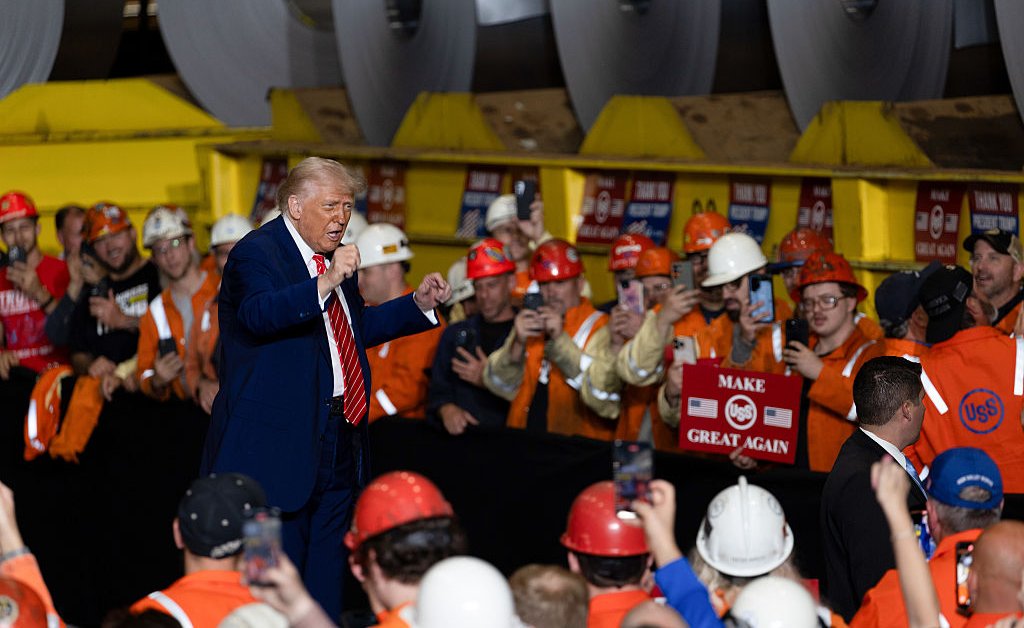Increased Steel And Aluminum Tariffs: Trump's Justification And The Economic Fallout

Welcome to your ultimate source for breaking news, trending updates, and in-depth stories from around the world. Whether it's politics, technology, entertainment, sports, or lifestyle, we bring you real-time updates that keep you informed and ahead of the curve.
Our team works tirelessly to ensure you never miss a moment. From the latest developments in global events to the most talked-about topics on social media, our news platform is designed to deliver accurate and timely information, all in one place.
Stay in the know and join thousands of readers who trust us for reliable, up-to-date content. Explore our expertly curated articles and dive deeper into the stories that matter to you. Visit Best Website now and be part of the conversation. Don't miss out on the headlines that shape our world!
Table of Contents
Increased Steel and Aluminum Tariffs: Trump's Justification and the Economic Fallout
The imposition of increased tariffs on steel and aluminum imports under the Trump administration sent shockwaves through the global economy. While justified by the then-president as necessary to protect American industries and national security, the decision sparked significant debate and resulted in a complex web of economic consequences. This article delves into the rationale behind the tariffs and analyzes their substantial impact.
Trump's Justification: National Security and Protecting American Jobs
President Trump's primary justification for the tariffs, implemented in 2018, centered on the assertion that steel and aluminum imports posed a threat to national security. He argued that reliance on foreign producers weakened the domestic steel and aluminum industries, leaving the U.S. vulnerable in times of crisis. This vulnerability, he claimed, extended beyond simple supply chain disruptions, impacting the production of crucial military equipment and infrastructure. The administration also highlighted the need to protect American jobs, suggesting that increased tariffs would revitalize the domestic steel and aluminum sectors, leading to job creation and economic growth. This narrative resonated with a segment of the population concerned about manufacturing job losses and the decline of American industry.
The Economic Fallout: A Ripple Effect Across Industries
The reality, however, proved far more nuanced. While some domestic steel and aluminum producers experienced short-term benefits, the increased tariffs triggered a chain reaction with significant negative consequences:
-
Increased Prices for Consumers: Higher tariffs translated directly into increased prices for goods containing steel and aluminum, impacting everything from automobiles and construction materials to consumer appliances. This inflationary pressure disproportionately affected lower-income households.
-
Retaliatory Tariffs: Trading partners retaliated with their own tariffs on American goods, leading to a trade war that harmed numerous American industries, particularly agriculture. This resulted in significant losses for farmers and ranchers.
-
Supply Chain Disruptions: The tariffs disrupted established global supply chains, forcing businesses to scramble for alternative sources of materials, often at higher costs. This increased uncertainty and complexity for businesses of all sizes.
-
Job Losses in Related Industries: While some jobs were potentially created in the steel and aluminum industries, many more were lost in sectors reliant on imported steel and aluminum, leading to an overall net loss of jobs.
-
Reduced Global Trade: The overall effect was a reduction in global trade, harming economic growth worldwide. The World Trade Organization (WTO) criticized the tariffs as violating international trade agreements.
Long-Term Economic Impacts: A Continuing Debate
The long-term economic consequences of the increased steel and aluminum tariffs are still being debated. Some economists argue that the short-term gains for domestic producers were outweighed by the significant negative impacts on other sectors and the overall economy. Others maintain that certain aspects of the domestic steel and aluminum industry benefited, although the overall economic picture remains largely negative. The episode serves as a stark reminder of the complex interdependencies within the global economy and the potential unintended consequences of protectionist trade policies.
Conclusion: A Case Study in Trade Policy
The Trump administration's steel and aluminum tariffs provide a compelling case study in the complexities of international trade policy. While the stated goals of national security and job protection were understandable, the actual economic fallout demonstrated the significant risks associated with unilateral protectionist measures. The experience underscores the importance of considering the broader economic ramifications of such policies and the need for multilateral solutions to address trade imbalances and protect domestic industries. Further research into the long-term impacts is crucial to informing future trade policy decisions.

Thank you for visiting our website, your trusted source for the latest updates and in-depth coverage on Increased Steel And Aluminum Tariffs: Trump's Justification And The Economic Fallout. We're committed to keeping you informed with timely and accurate information to meet your curiosity and needs.
If you have any questions, suggestions, or feedback, we'd love to hear from you. Your insights are valuable to us and help us improve to serve you better. Feel free to reach out through our contact page.
Don't forget to bookmark our website and check back regularly for the latest headlines and trending topics. See you next time, and thank you for being part of our growing community!
Featured Posts
-
 Angry Residents Take To The Streets Protests Erupt Over Dte Energy Price Hikes
Jun 02, 2025
Angry Residents Take To The Streets Protests Erupt Over Dte Energy Price Hikes
Jun 02, 2025 -
 Trading Halt China And New Zealand Markets Closed Monday June 2nd 2025
Jun 02, 2025
Trading Halt China And New Zealand Markets Closed Monday June 2nd 2025
Jun 02, 2025 -
 China Tariffs Jamie Dimons Warning And The Implications For The Us Economy
Jun 02, 2025
China Tariffs Jamie Dimons Warning And The Implications For The Us Economy
Jun 02, 2025 -
 Death Investigation Burned Body Found By Hiker At Stone Mountain Park
Jun 02, 2025
Death Investigation Burned Body Found By Hiker At Stone Mountain Park
Jun 02, 2025 -
 The 2 C Threshold A Timely Call For Corporate Climate Action
Jun 02, 2025
The 2 C Threshold A Timely Call For Corporate Climate Action
Jun 02, 2025
